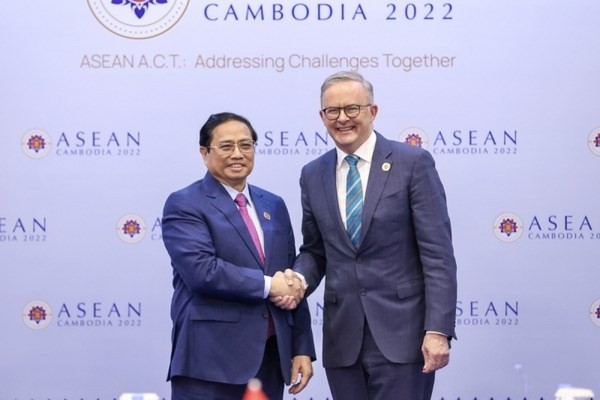
PM Anthony Albane’s visit expected to lift up Vietnam-Australia partnership
Latest
 |
| PM Anthony Albane’s visit expected to lift up Vietnam-Australia partnership: Prime Minister Pham Minh Chinh (L) meets with Australian Prime Minister Anthony Albanese on the occasion of the 40th and 41st ASEAN Summits in Cambodia (Photo: VNA) |
This is the first official visit to Vietnam by Anthony Albanese since taking office and only two months after the state visit by Australian Governor-General, showing Australia's great attention to the Southeast Asian nation.
Highlighting the Vietnam-Australia partnership in peacekeeping operations, Colonel Pham Manh Thang, Director of the Vietnam Department of Peacekeeping Operations, said that Australia was one of the first countries to sign a memorandum of understanding (MoU) with Vietnam in UN peacekeeping activities in 2015.
The MoU laid a foundation for the two countries to implement cooperation activities including English training, joint training, and equipment support.
Australia has provided English training to soldiers and officials of the Vietnamese Engineering Company, and the Level-2 Field Hospital as well as its Airborne Rescue Teams, said Colonel Thang, adding that each year the two sides have organised professional exchanges and experience sharing in the field of UN peacekeeping.
Particularly, since 2018, 16 flights using C-17 aircraft of the Royal Australian Air Force have transported nearly 300 officials and medical staff and about 300 tonnes of equipment for the Vietnam's Level-2 Field Hospital to perform missions in South Sudan and return home safely, he noted.
Australian Ambassador to Vietnam Andrew Goledzinowski commented that collaboration between the two countries in peacekeeping activities has been a highlight in bilateral relations. He held that the Vietnamese Level-2 Field Hospital has made important contributions to providing medical services to UN peacekeepers as well as the local community in Bentiu, South Sudan.
In the future, Australia hopes to further promote partnership with Vietnam in peacekeeping operations, and witness Vietnam’s performing increasingly positive and constructive role in the global peacekeeping activities, said the Australian Ambassador.
During his recent State visit to Vietnam, Australian Governor-General David Hurley, together with President Vo Van Thuong, visited the Vietnam Department of Peacekeeping Operations, during which Hurley underscored that Vietnamese peacekeepers’ operational efficiency and professionalism have contributed to making changes to the world.
Recognising contributions that Vietnamese peacekeepers made to bringing better lives to locals in areas where they are stationed, Hurley affirmed
the meaning of Vietnam-Australia joint efforts in the work, affirming that Australia hopes to continue to cooperate with and support Vietnam in UN peacekeeping.
Highly valuing Australia’s support to Vietnam in the field, President Vo Van Thuong said that with its rich experience in training and deploying forces for UN peacekeeping operations, Australia has provided positive and effective support to Vietnam during the activities. He expressed his wish to continue to receive practical and efficient assistance from Australia in the field in the coming time.
Regarding education cooperation, with about 31,000 students studying in Australia, Vietnam ranks fourth in the number of students in the country.
Australia has provided a large number of short and long-term scholarships to Vietnamese students. As of March this year, 45 training linkage
programmes and 200 cooperation agreements on joint researches have been signed among universities and research institutes of the two countries. They have also implemented 37 joint training programmes.
RMIT University has opened two campuses in Hanoi and Ho Chi Minh City with more than 6,000 students. It plans to launch new campuses in
Da Nang, Can Tho and Hai Phong, while adding about 100 million AUD (66.01 million USD) of investment in Vietnam. In October 2021, the two countries signed an agreement to supplement the Vietnam - Australia Human Resource Development Programme for the 2021 – 2025 period at a cost of 50.1 million AUD. After nearly two years of hiatus due to COVID-19, in December 2021, Australia began to open its borders to welcome international students, including Vietnam, to return to Australia.
During his Australian visit last December, Vietnamese National Assembly Chairman Vuong Dinh Hue attended a Vietnam-Australia education cooperation forum, during which he said that Vietnam wishes to promote education partnership with Australia at the State, ministry and department levels.
At the State level, the two sides should exchange experience on university administration, the national training programme frameworks at all levels, and innovation startup among students, he said.
Australian Senator Tim Ayres, Assistant Minister for Trade and Assistant Minister for Manufacturing, said that education cooperation has been a key pillar in the bilateral partnership. The two sides are making a lot of specific efforts to improve the efficiency of cooperation in this field as well as in the fields of economy, trade and investment between the two countries, said the Senator, stressing that the cooperation is not only meaningful to individuals but helpful for the improvement of capacity for all institutions. Australian educational institutions are also eager to expand cooperation with Vietnam, he said.
In a meeting with Australian Ambassador to Vietnam Andrew Goledzinowski, Minister of Education and Training Nguyen Kim Son asked the Australian side to further strengthen the exchange of students with Vietnam, support Vietnam in English training and encourage Australian universities to open their branches in Vietnam.
Ambassador Goledzinowski affirmed that Australia will work closely with Vietnam in the field.
Peacekeeping operation and education are two of many fruitful cooperation areas between the two countries. The upcoming visit by Australian PM Anthony Albanese is also expected to reinforce political trust and all-round cooperation between the two countries, especially in politics, diplomacy, security, defence, economy, investment, labour, technology, climate change response, and people-to-people exchange.

















